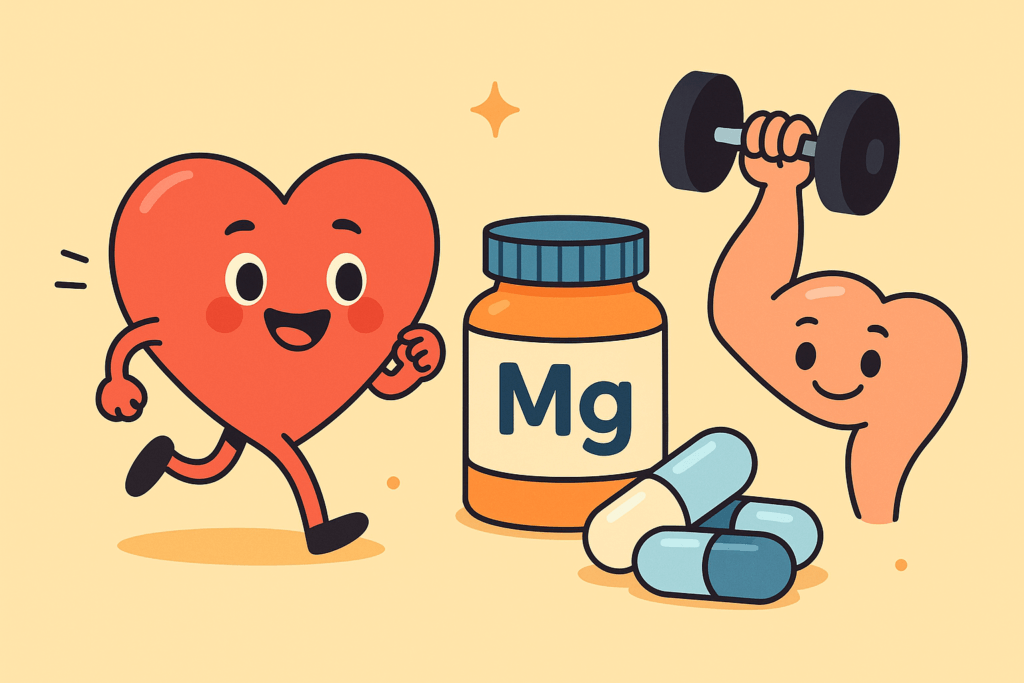Magnesium is often called the “forgotten mineral,” yet it is one of the most important nutrients your body needs to thrive. From regulating energy production to maintaining heart rhythm and keeping your nervous system calm, magnesium touches almost every function in the human body. Despite its importance, studies suggest that more than half of adults don’t meet their daily magnesium requirements.
A magnesium supplement becomes essential for many people, especially after their 30s when stress, poor diet, and lifestyle factors increase nutrient demands. But here’s the catch—not all magnesium supplements are absorbed the same way. Some forms are far more bioavailable than others, meaning your body can absorb and use them more effectively.
In this article, we’ll break down the most bioavailable forms of magnesium, their unique benefits, and how to choose the right one for your needs.
Why Magnesium Matters So Much
Magnesium is involved in more than 300 enzymatic processes in the body. That’s not just a small role—it’s foundational. Here’s why magnesium deserves more attention in your daily wellness routine:
- Energy Production: Magnesium helps convert food into usable energy, supporting ATP synthesis. Without it, fatigue becomes a constant companion.
- Nervous System Regulation: It balances neurotransmitters, which control mood, stress, and relaxation.
- Muscle Function: It ensures muscles contract and relax properly, reducing cramps and soreness.
- Heart Health: It keeps the heartbeat steady and regulates blood pressure.
- Bone Strength: It partners with calcium and vitamin D to maintain bone density.
- Blood Sugar Control: Magnesium supports insulin sensitivity and prevents spikes in blood sugar.
When levels drop, symptoms often appear gradually: low energy, poor sleep, irritability, frequent headaches, muscle cramps, or even irregular heartbeat. Many people chalk these up to “getting older,” when in fact, they may simply need more magnesium.

The Most Bioavailable Forms of Magnesium
Not all magnesium supplements are equal. Some forms pass right through the body with little absorption, while others are easily taken up by cells. Here’s a detailed look at the most bioavailable forms of magnesium:
1. Magnesium Glycinate
- Bioavailability: Excellent
- Why it stands out: Binds magnesium with glycine, an amino acid that promotes relaxation.
- Best for: Sleep, anxiety, stress relief, chronic pain.
Magnesium glycinate is gentle on the stomach and unlikely to cause laxative effects, making it one of the most recommended choices for long-term daily use. It is especially effective for people who struggle with poor sleep, anxiety, or high stress. Many experts consider this the best all-around magnesium supplement.
2. Magnesium Citrate
- Bioavailability: High
- Why it stands out: Combines magnesium with citric acid, enhancing absorption.
- Best for: Digestion, relieving constipation, general supplementation.
Magnesium citrate is widely available and highly absorbable. It does have a mild laxative effect, which can be beneficial for people with digestive sluggishness but may be inconvenient for others. If taken in small doses, it offers excellent benefits without discomfort.

3. Magnesium Malate
- Bioavailability: Good
- Why it stands out: Combines magnesium with malic acid, which plays a role in the Krebs cycle (energy production).
- Best for: Fatigue, fibromyalgia, muscle pain.
Lycopene: The Antioxidant Powerhouse for Heart, Skin, and Prostate Health
Magnesium malate is a favorite for people dealing with chronic tiredness or muscle soreness. Athletes and those with high activity levels often benefit from this form because it directly supports energy production.
4. Magnesium Threonate
- Bioavailability: Very High (to the brain)
- Why it stands out: Crosses the blood–brain barrier, which most forms cannot.
- Best for: Memory, learning, cognitive decline prevention.
Magnesium threonate is newer on the supplement scene but has gained popularity because of its impact on brain health. Early research shows it may improve memory, focus, and learning ability. It’s particularly useful for students, professionals, and older adults who want to support long-term brain function.

5. Magnesium Chloride
- Bioavailability: Good
- Why it stands out: Can be taken orally or used topically.
- Best for: Muscle cramps, relaxation, topical sprays.
Magnesium chloride is versatile. It’s often found in magnesium oils or bath flakes that can be absorbed through the skin. This makes it ideal for people who prefer external application or need localized relief for sore muscles.
6. Magnesium Taurate
- Bioavailability: High
- Why it stands out: Combines magnesium with taurine, an amino acid beneficial for the heart.
- Best for: Heart health, blood pressure regulation, cardiovascular protection.
If your concern is primarily heart health, magnesium taurate is a top option. It helps regulate blood pressure and supports cardiovascular function, making it a unique choice compared to other forms.

7. Magnesium Orotate
- Bioavailability: Good
- Why it stands out: Linked with orotic acid, which supports DNA and RNA production.
- Best for: Cellular repair, heart health, physical endurance.
Athletes and those with heart conditions sometimes prefer magnesium orotate because it has been studied for its role in improving exercise performance and supporting cardiac health.
Benefits of Magnesium Supplements
No matter the form, magnesium supplements offer a broad range of benefits. Here’s a deeper dive:
1. Better Sleep and Relaxation
Magnesium activates the parasympathetic nervous system, the “rest and digest” state. It also regulates melatonin, the sleep hormone. Many people find that taking magnesium glycinate before bed results in deeper, more restful sleep.
2. Reduced Stress and Anxiety
By regulating GABA, a calming neurotransmitter, magnesium reduces feelings of stress and anxiety. This makes it a natural option for people looking to support mental health without heavy medications.
3. Stronger Muscles and Less Pain
From preventing night-time leg cramps to reducing muscle fatigue post-exercise, magnesium is vital for muscle health. Forms like malate and chloride are especially effective in this area.
4. Heart Health Protection
Magnesium regulates blood pressure, supports proper heart rhythm, and reduces arterial stiffness. Low magnesium has been linked with hypertension, arrhythmias, and increased cardiovascular risk.
5. Bone Density and Strength
Calcium gets much attention for bones, but without magnesium, calcium can’t be properly metabolized. Magnesium helps direct calcium into the bones instead of soft tissues, reducing the risk of osteoporosis and kidney stones.
6. Blood Sugar Control
Magnesium improves insulin sensitivity, which helps regulate blood sugar levels. This makes it particularly beneficial for people with prediabetes or type 2 diabetes.
7. Brain Function and Memory
Forms like magnesium threonate directly support brain cells and synaptic plasticity, improving memory, focus, and learning ability.
Side Effects and Precautions
Magnesium is safe when taken within recommended doses. However:
- Too much magnesium citrate can cause diarrhea.
- Over-supplementation may lead to nausea, abdominal cramping, or low blood pressure.
- People with kidney disease should consult a doctor before supplementing.
As with all supplements, moderation and expert guidance are key.
FAQs About Magnesium Supplements
1. Which form of magnesium is the best overall?
Magnesium glycinate is often considered the best overall due to its high bioavailability and minimal side effects.
2. Can magnesium help with anxiety?
Yes. Magnesium regulates neurotransmitters like GABA, which calm the nervous system and reduce stress.
3. What time of day should I take magnesium?
Evening is best for glycinate (promotes sleep). Morning works for citrate (aids digestion).
4. Is it safe to take magnesium daily?
Yes, within recommended dosages (300–400 mg for adults). Consistency matters more than high doses.
5. Can magnesium be used for migraines?
Many people report reduced frequency of migraines with regular magnesium supplementation, especially magnesium citrate or glycinate.
6. Is topical magnesium effective?
Yes. Magnesium chloride sprays and Epsom salt baths can be absorbed through the skin for muscle relief.
